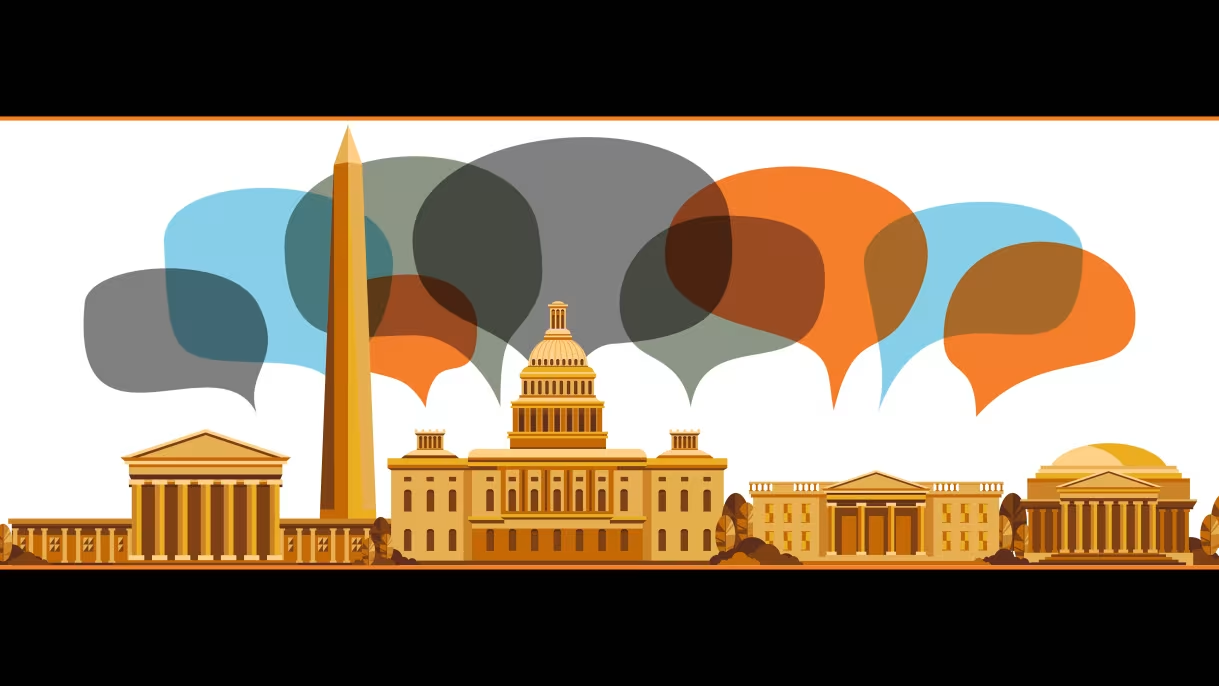

How P•LAW Workshops Tackle Democracy’s Toughest Questions
In the years following 9/11, Deborah Pearlstein learned a lasting lesson on how to make progress in divisive moments.
As the former Supreme Court clerk worked on addressing serious questions of legality in U.S. detention and interrogation operations, she organized an off-the-record workshop that brought together a select group of leaders from across institutions that don’t typically collaborate – including the military and intelligence communities, universities, and advocacy organizations. As a result of relationships forged beginning at that meeting, retired military leaders joined forces with human rights groups to become prominent backers of anti-torture legislation – a coalition that proved pivotal in securing the law’s ultimate passage.
“The idea was that, in an off-the-record setting, you can pose a specific kind of problem, bring together a small group of high-level people from mixed disciplines, and compel the blending of groups that usually doesn’t happen. It leads to enormously valuable discussions and much deeper understanding of the competing interests at stake,” said Pearlstein, who is now the Charles and Marie Robertson Visiting Professor in Law and Public Affairs at the Princeton School of Public and International Affairs.
Pearlstein also directs the School’s Program in Law and Public Policy (P•LAW), where she has adapted that successful model into the Princeton Problem-Solving Workshops in Law and Policy. The goal of the workshops is to move the needle on a variety of timely issues, from the politicization of the Department of Justice to polarization in the Senate.
The daylong workshops create a space for deep analysis of important issues, beginning with a genuinely posed policy question. The goal isn’t to reach a consensus, but the outcomes from the workshops are often remarkable: Past participants have worked together to inform executive branch decision-making, developed working groups with congressional staff to advance novel policy solutions, and shaped public opinion through op-eds in prominent news publications.
“We are taking on problems that feel intractable and getting together people who don’t talk to each other a lot,” Pearlstein said. “The goal isn’t to make a point, it’s to make an actual difference.”
At a recent workshop at Princeton SPIA in D.C., 30 invited guests sat at tables in a square facing one another. They included academics, attorneys, political scientists, current and former Senate staffers – including a historian and parliamentarian – election reform workers, and representatives of major NGOs and think tanks.
Each workshop is conceived by a leading scholar in law and public policy, in this case Edward B. Foley, one of the nation’s leading election law experts, a constitutional law professor at Ohio State University, and a visiting faculty fellow with P•LAW this past year. After opening remarks by Pearlstein, Foley laid out the intention for the day: to focus on a specific part of a complex problem and evaluate the effectiveness and feasibility of several potential solution sets.
Participants dove in quickly, taking turns speaking by raising their name cards. Over the course of the first hour, they discussed latest research findings on the causes of Senate polarization and how the electoral system contributes to it.
The group laid out a series of challenges that keep the Senate from passing more bipartisan legislation, including the amount of time confirmation hearings consume in the Senate schedule, how campaigns shape the way lawmakers behave in Washington, and the vagaries of Senate rules of procedure. Questions peppered throughout the conversation included: Might getting senators to spend more informal time together decrease polarized behavior? Are senators accurately judging what their primary voters really want? How well can we predict how electoral reform might impact candidate extremism across districts?
Such frank dialogue is the reason why these workshops are so effective, Pearlstein noted. They allow the people in the room to think openly about competing policy options and hear from a variety of perspectives.
As the group began discussing whether rule changes could have a positive impact on the Senate, Foley jumped in to encourage the group, saying, “As new solutions come up, they’re not off the table.”
The next part of the day was dedicated to discussions of specific solutions: potential changes to Senate procedures, pathways toward the elimination of partisan primaries, and innovative electoral methods. Following these discussions, the facilitators assigned participants to small groups where they could discuss possible next steps.
By the end of the day, the group had agreed on various follow-up steps. A handful agreed to form a working group to pursue a near-term reform to Senate rules they suspected might draw bipartisan support. Another group wanted to explore developing a 20-year plan for electoral reform. Others identified gaps in research that needed to be filled to determine the likely impact of a proposed reform.
There were also informal ways the day influenced attendees and facilitated collaboration. Foley wrote a Substack post inspired by the workshop. A participant invited others to speak at an event he holds, and another recruited people to join her listserv so they could keep the conversation going.
“This kind of workshop can be both community-building and idea-advancing,” Foley noted.

